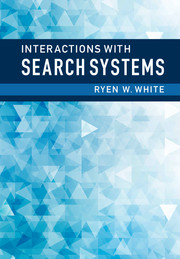Book contents
- Frontmatter
- Dedication
- Contents
- Preface
- 1 Introduction
- Part I Background
- Part II System SupportHelping People Search
- 5 Helping People Search
- 6 Exploration, Complexity, and Discovery
- 7 Learning and Use
- 8 Interaction beyond the Individual
- 9 Personalization and Contextualization
- Part III Evaluation
- Part IV Opportunities and Challenges
- Notes
- References
- Index
- Plate section
6 - Exploration, Complexity, and Discovery
from Part II - System SupportHelping People Search
Published online by Cambridge University Press: 05 March 2016
- Frontmatter
- Dedication
- Contents
- Preface
- 1 Introduction
- Part I Background
- Part II System SupportHelping People Search
- 5 Helping People Search
- 6 Exploration, Complexity, and Discovery
- 7 Learning and Use
- 8 Interaction beyond the Individual
- 9 Personalization and Contextualization
- Part III Evaluation
- Part IV Opportunities and Challenges
- Notes
- References
- Index
- Plate section
Summary
As the range of search tasks that people perform on search engines increases, supporting searchers in examining results, exploring result spaces, and discovering new insights from data will become key requirements in the design of search systems. An important part of providing this support is to identify when searchers are exploring and to design search interfaces to support exploratory activities.
In Chapter 5, I mainly focused on searching for information as an activity that search systems should support directly, and I discussed some of the existing and emerging techniques to support searchers in performing those searches. The focus for much of the work covered were cases for which the target of the search is known. Although search engines continue to improve how they handle lookup-based searches (assisted to a large extent by the availability of behavioral data), support for ill-defined, exploratory scenarios needs to be expanded. There is a range of information tasks for which information goals are less clearly defined; those tasks are built around searchers’ desires to explore (e.g., Marchionini 2006a; White and Roth, 2009). As discussed in detail in Chapter 4, exploration is an important aspect of information behavior that can be motivated by intrinsic and extrinsic motivations (Berlyne, 1960). The exploration of information spaces can yield key new insights and advances, promote serendipity, and foster creativity. Exploration is central in activities such as learning, understanding, and decision making. All of these outcomes may occur during the search for known items, but the attainment of such goals is not a primary objective in traditional search systems. However, searchers’ expectations are evolving and next-generation search system designers need to consider exploration and discovery as central elements of the search process.
In this chapter, I focus on both exploratory and complex search tasks, which have many of the following characteristics:
• Emphasis on learning and discovery, driven by task requirements and/or a desire to learn;
• Ill-defined and multi-aspect;
• Require both search and browsing;
• Higher-level goals beyond finding, such as enhanced understanding and decision-support; and
• Long-term (searches over multiple sessions) and persistent (even if searcher is not actively searching).
Exploration can range from general exploratory behavior (as defined in Section 4.1) to behavior associated with exploratory or complex search tasks, which is a more directed action (Marchionini, 1995).
- Type
- Chapter
- Information
- Interactions with Search Systems , pp. 201 - 230Publisher: Cambridge University PressPrint publication year: 2016
- 1
- Cited by



